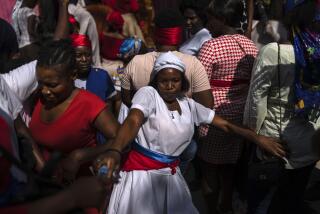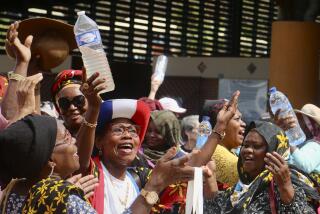Disaster Blamed on the Gods : Nation of Deep Contrasts Fights an Odd Catastrophe
- Share via
PARIS — Cameroon, a contrast of old and new, is using modern technology to fight a natural disaster that some of the threatened people attribute to ancient volcano gods.
For rescue workers racing from Cameroon’s high-living modern capital, the stricken area near Wum might be another planet. Wum is far more different from Yaounde than Yaounde is from Paris.
Their destination is a dramatic chain of volcanic peaks and valleys that reach into eastern Nigeria. It is an area of ranches, tourism and smugglers, with some of Africa’s most spectacular terrain.
Rescue teams, shuttled in helicopters, rely on gas masks and testing devices. Villagers and herders depend more on amulets and the good will of their gods.
Industrious Traders
The threatened people are Fulani and other ethnic groups who live just north of the Bamileke, an industrious tribe of traders and farmers who lost out in a bitter fight for national power.
Some who live near the lake are Roman Catholics who traveled to the western town of Bamenda to see Pope John Paul II last year. Others are Muslims, but most are animists, who believe that spirits reside in plants, objects and natural phenomena.
They live in huts of mud and straw that cling to the hillsides, growing millet and cassava. Their highlands are some of Africa’s best cattle country, and many measure wealth in livestock.
In 1861, English explorer Richard Francis Burton led a race up the nation’s most prominent volcano, the 13,353-foot Mt. Cameroon, to scout out a hill station where colonials could escape the pestilential coast.
Angry Eruptions
For local people, Mt. Cameroon is Mudongo ma Loba, the Mountain of the Gods. They believe its eruptions signal the immortal anger, which sometimes has exacted heavy tolls.
The latest tragedy occurred 150 miles to the north in a range separated from Mt. Cameroon by lowlands.
Volcano country is in West Cameroon, which was explored by the British, colonized by the Germans and then taken over again by Britain. It joined the larger French portion at independence in 1961 to form Africa’s only bilingual French-English nation.
On a turbulent continent, Cameroon is stable and prosperous, with oil and minerals, agriculture and modest but substantial industries.
Ahmadou Ahidjo, its first leader, avoided the political rhetoric and experimental economics that left many other emergent nations in shambles.
When oil was discovered, he put the profits into agriculture and communication, escaping the economic turmoil suffered by Nigeria and Gabon, neighbors on the West African coast.
Failed Coup
Ahidjo suppressed political opposition, sometimes with France’s help, and chose Paul Biya to take over as president in 1982. Biya survived a coup attempt two years later.
In contrast to primitive lifestyles in the remote mountains, northern deserts and thick rain forests, the port of Douala is a humming metropolis of high-rise buildings, noisy discos and elegant restaurants.
Douala, on the rain-sodden coast at the bend of Africa, is a mixture of old colonial town and a boom city. American oilmen stride the mossy sidewalks, doing business with French bankers and Lebanese importers.
Yaounde is smaller, spread over the hills of central Cameroon. It has the university and research centers and is the hub of railways and roads that link the country, which is the size of California.
More to Read
Sign up for Essential California
The most important California stories and recommendations in your inbox every morning.
You may occasionally receive promotional content from the Los Angeles Times.












